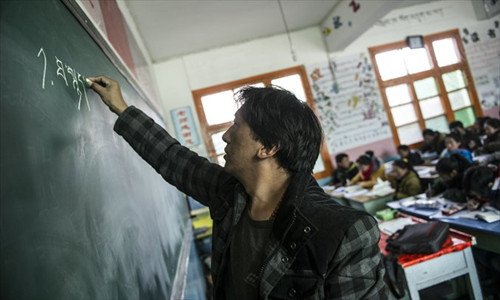
A teacher gives a lesson in Tibetan at a bilingual primary school in Aba, Sichuan Province on March 4.
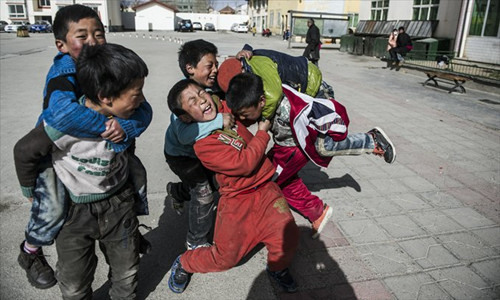
Students of a primary school in Aba play during morning break.
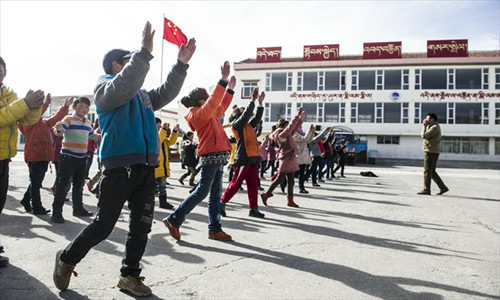
Students do morning exercises at a primary school in Aba on March 4.
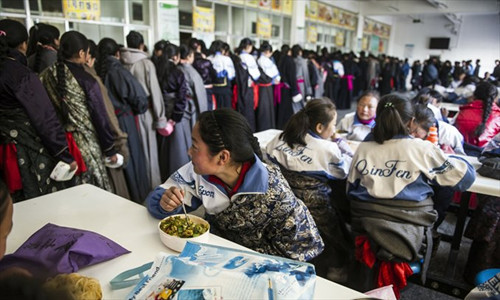
Students have lunch in a cafeteria at Hezuo No.3 High School in Gannan, Gansu Province on March 7.
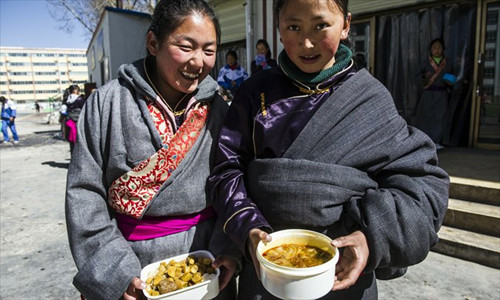
Tibetan students Gonpo Tso and Rinchen Tso show their lunch - rice with potato and beef, and beef soup with vermicelli, each dish costing 4 yuan. Photos: Li Hao/GT
It has long been believed that education is crucial to the future of less developed and remote areas, especially China's Tibetan areas outside the Tibet Autonomous Region.
Limited resources and access to information have kept many out of school and given them little chance to have contact with the outside world. But the increasing number of self-immolations in the region has prompted local authorities to try and ensure that more children attend school, helping them stay away from the influences of religious extremism and separatism.
The past decade has seen substantial changes in the Tibetan areas of Sichuan, Gansu and Qinghai provinces with more governmental funding going to free education for children. In the prefecture of Aba in Sichuan and that of Gannan in Gansu, the government has been trying to cover as many children as possible with the nine-year free compulsory education program.
Huang Kaisheng, an education bureau director in Aba, told the Global Times that the county's primary schools had only a 60 percent enrollment rate in 2002 but that this had been extended to 99 percent of local children by the end of 2012, while students receive 200 yuan of subsidies monthly.
Among the Aba prefecture's 25 primary and middle schools, 23 use bilingual education. A boarding school that Global Times reporters visited contained 1,256 Tibetan students, being taught in Tibetan with Chinese language classes twice a week. Meanwhile, teachers have been educating students on Tibetan history and counter-separatism, explaining to them the motives of the Dalai Lama clique through self-immolation cases in Aba, Huang said.
Sichuan authorities launched a program in 2009 to provide students in Tibetan areas with nine years of compulsory education plus a three-year vocational education in bigger cities, all free of charge. Around 30,000 students have attended the program so far, 87 percent of whom come from a farming or herding background, with many returning to their hometowns to work after graduation.
Some families do choose to send their children to be monks instead of going to school. This Global Times reporter saw many young monks, some younger than 10, in major monasteries including Kirti. Huang admitted that some Tibetans did not necessarily view attending school as key to securing a good job.
In Hezuo, capital of Gannan prefecture, 97 percent of children are enrolled in nine-year education, and senior high school education also became free of charge last year. Ma Dengming, headmaster of the Hezuo No.3 High School, said that the government offers a 1,500 yuan yearly allowance to students coming from lower-income families.
Hezuo has been victim to at least four self-immolations since October last year, according to officials, and schools have been promoting a counter-immolation education among students.
Ma said legal lectures have been organized alongside psychological advice on counter-immolation. Teachers also encourage students to share what they have learned with their families at home.

Copyright ©1999-2011 Chinanews.com. All rights reserved.
Reproduction in whole or in part without permission is prohibited.